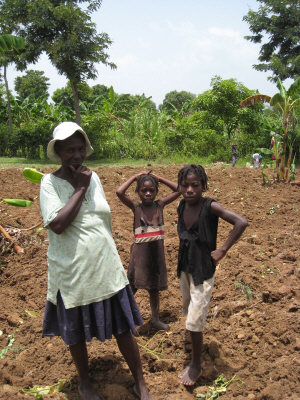Dispatch from Haiti: “We are Forming Ourselves”
“N’ap forme” are the first words that I hear after stepping into an open-air training center high in Haiti’s Central Plateau after a nail-biting plane ride across the mountains in a four-seater Cessna. The training center is run by the Peasant Movement of Papay (MPP), a Grassroots International partner. N’ap forme is the Kreyol way of saying we are training, literally, we are forming ourselves.
Chavannes Jean Baptiste, the longtime leader of MPP and a fixture in the Haitian fight for resource rights, greets me as he would a member of his own family, even though it is the first time we have met face-to-face. The center is buzzing with activity – peasant leaders from all but two of Haiti’s 10 departments have travelled long distances to bring their people’s concerns to the table and figure out solutions to the root causes of economic hardship in their broken country.
 I take long walks and motorcycle rides around the area, visiting some of the many projects that the MPP has pursued in their 35 years of organizing – during nearly half of which they have been a partner of Grassroots International. Even the land itself impresses me, with young forests and farms growing in what used to be a wasteland. Like much of Haiti today, the Papay region was so deforested that people were unable to live off the land and were defenseless in the face of natural disaster. Now Papay is rich with various fruit and forest cover, a humble paradise at the crossroads of hardship. A new friend from the MPP tells me, “It is us who have to undertake the work necessary to create such a place.” His dream is to look out over the mountains in 10 years and see Haiti as it once was.
I take long walks and motorcycle rides around the area, visiting some of the many projects that the MPP has pursued in their 35 years of organizing – during nearly half of which they have been a partner of Grassroots International. Even the land itself impresses me, with young forests and farms growing in what used to be a wasteland. Like much of Haiti today, the Papay region was so deforested that people were unable to live off the land and were defenseless in the face of natural disaster. Now Papay is rich with various fruit and forest cover, a humble paradise at the crossroads of hardship. A new friend from the MPP tells me, “It is us who have to undertake the work necessary to create such a place.” His dream is to look out over the mountains in 10 years and see Haiti as it once was.
On the way to a local water source, where one of the projects supported by Grassroots International is in full swing, we stop to talk to the mayor. His Kreyol is thick and dense, but I understand the immediate importance of our solidarity with the community in conserving rainwater in this untypically arid corner of Haiti. Peasants come to work here, creating a sort of terracing with intricate rock walls in order to manage mountain runoffs. This allows rainwater to permanently pool, and fish are abundant. Trees are being planted everywhere. People tell me that while some international groups haphazardly plant random seeds, MPP agronomists are constantly studying which trees are native to Haiti and making every effort possible to recreate the natural landscape.
Back at the center, everything happens in the spirit of community and sustainability. We drink local coffee, eat from the plentiful gardens, and compost waste. Peasants grow vegetables in recycled tires and plastic tubes. Farmers come from far away to bring seedlings back to their lands that will both grow into trees and provide food for their families. A women’s group busily harvests medicinal plants and a young people’s group creates a new banana field. This is movement building and food sovereignty in action.
I join the training of peasant leaders for their afternoon meetings that run late into the night. Their analysis of the internal and external forces that plague Haiti is astonishing. We make lists on an old blackboard of macro-economic policies aimed at trade liberalization and privatization of resources that have sent Haiti on a downward spiral. It feels like one of my graduate-level seminars on the politics of globalization. The rain is so loud that we can barely hear one another. We huddle together and keep exploring – keep believing that another Haiti is possible. N’ap forme – We are forming ourselves.
